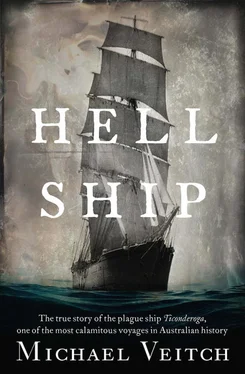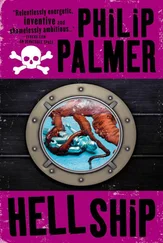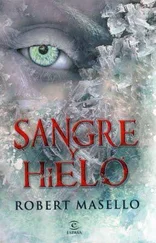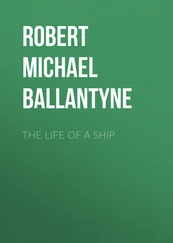A doctor, he had heard this very morning on one of his regular leisurely visits to Haymarket in Melbourne to meet friends and read the newspapers, had just returned from the quarantine station itself. Two or three people were still dying every day, he had said. Some said the disease was yellow fever, others that it was the dreaded scarlet fever. Others still said it was yellow jack, a terrifying sickness usually found in the American south, but since the ship had come from that part of the world in the first place and traded there regularly, that’s what some had convinced themselves it was. McIvor listened solemnly but said nothing.
Then, late one evening on the day before Christmas Eve, while McIvor’s wife—known to all simply as Granny—was making the shortbread with the imprint of the Scots thistle, a knock was heard at the door. Visitors at this hour were not usual, and when McIvor answered the door, he nearly fell back in the stoop with shock. Standing before him was a young man, barely older than a boy. He was filthy, thin and exhausted, but in the unmistakable accent of his homeland, uttered the words he had for days repeated over in his head,
Your cousin, the wife of Malcolm McRae, came in the ship Ticonderoga . I am her son, but my sister Janet and my two younger brothers died of the fever since we were landed at Point Nepean, and I have walked from that place with another young man and we followed the beach till we came to Melbourne. [1]
With that, the young man, seventeen-year-old Christopher McRae, collapsed in the doorway.
McIvor shouted to his wife, and as both of them brought the boy inside, she exclaimed loudly in Gaelic. Here was young Christopher, the son of her dear cousin Helen, having come all that way from Inverness—can you believe it?—and on that terrible ship everyone was talking about. They sat him down and he devoured the fresh scones that had been prepared, as well as the tea.
* * * *
A few weeks earlier, Christopher McRae had watched his father approach Captain Boyle on the deck of the Ticonderoga to seek permission to go ashore and bury his sister, ten-year-old Janet. The kind man had assented and Christopher helped to bring his sister’s body up from where she lay in the female hospital. Then, in a small rowboat, they had been taken to the shore of the little beach where, guided by one of the seamen, they had been shown the freshly marked-up burial ground and prepared the little girl’s grave. Upon returning to the ship , it transpired that his baby brother, Malcolm, his mother’s joy, had died too. Then, a short time later, it was the turn of another brother, Farquhar, just six. As he told the story to his ageing cousins, Granny McRae let out a terrible cry, and an ancient Gaelic lamentation filled the room. She clutched her husband’s hand; he could only shake his head and stare at the floor in silence.
Christopher had been able to bear the grief of the beach no longer. Besides, he sensed his turn too would surely come if he stayed there amid the death of the quarantine station. With another young man whose name has now been forgotten, one evening he simply decided to take a walk along the beach away from the station and not return. They had told his father, who was in no position to object. He was too busy looking after his wife, Christopher’s mother Helen, but gave them the address of her cousins in Melbourne and told them to find them and tell them what had happened. Christopher and the unknown young man set out on their trek along the beach, neither knowing nor caring where it was leading, nor how they were going to get there. All they knew was that the settlement of Port Phillip was somewhere to the north, at the end of this beach. Exactly how far that was, they had no idea.
For two weeks they had walked, hugging the shore where they could, or scrambling over cliffs. They drank from puddles in the rocks, and their only sustenance came courtesy of the Aboriginal people who ate the shellfish on the shore, and a couple of surprised but kindly squatters or leaseholders who took pity on the lads and their story, furnishing them with an occasional meal.
They crossed rivers and creeks, sleeping where they could and travelling when they were able. Eventually, they came across a few outlying dwellings, which then became more frequent before passing, without them realising, the former quarantine station at Little Red Bluff, now abandoned. It was hard going and exhausting, but eventually they arrived in Melbourne, worn out after an overland journey of nearly 60 miles. At no time, despite the hardship, had they for an instant been tempted to return to the camp at the beach. Exactly how Christopher McRae managed to find his way to the address in Coburg has endured in the family as a minor miracle.
The tragedy of the McRae family was not yet finished. Three days into the new year, 1853, having lost four of her seven children, Helen McRae became one of the Ticonderoga ’s final victims and also died, to be buried alongside her children: Janet, Farquhar, John and Malcolm. Having travelled so far from Scotland, she never did manage to again meet with her cousin Granny McRae in Coburg.
27
A visit from the Governor
The Australian summer began, and the people of the quarantine station were jolted into the realities of a climate that was entirely alien to them. Fair Celtic complexions that had never known harsh sunlight were now seared, first red then, eventually, a deep nut brown. Even the light had been a revelation, with the glare of the Australian sky forcing eyes to squint constantly in ways they had never had to do except at the very height of northern hemisphere summer—and even then only on a handful of days. Then there were the flies, which seemed to balloon exponentially in great black crawling clouds as the quarantine camp became established, feeding and breeding in the waste and remains of butchered animals, poorly disposed of in shallow pits. Little more than waving branches and smoke from fires could keep them at bay.
Cooking facilities remained basic, as did the water supply, which came exclusively from wells sunk into the sand and, thankfully, did not run dry and the food was plentiful and nutritious, being regularly supplied from the nearby cattle estates of Mr Barker and others. Some of the lime-burners whose leases remained intact—there were six issued on that part of the peninsula in all—were also able to make money selling eggs, milk and a range of other supplies from their smallholdings outside the boundaries of the camp.
Slowly, as the weeks went by, the health of most of the 300–400 patients (the precise figure is difficult to pin down) began to improve. Time passed slowly for both the healthy and the healing passengers, spent in long walks along the beach and the surrounding dunes, and among the twisted and alien trunks of the ti-trees, unlike any vegetation the passengers had ever seen in the glens or on the western isles of their old home of Scotland.
The sea, now that they were not actually on it, seemed beautiful and ever-changing, with the calmness of the bay in front of them contrasting with the drama of the open ocean just the other side of their little peninsula, in places only a few hundred yards to their rear. The infestation of typhus-carrying lice, so compounded in the sardine-like confines of the ship, here began to lessen as people were at last able to spread out. While there is no anecdotal evidence of sea bathing having taken place, it would be safe to assume at least some did occur, in which case the cleansing effect of washing away lice from the body would have been profound.
For many, simply the rest, walking along the shore and observing the changing moods and colours of the ocean and rocks were enough to begin the process of emotionally healing from the terrors of the voyage and its aftermath. The most serious cases remained on board the Lysander, and many of those would make up the 70 or so people who would die at the station between the arrival of the Ticonderoga in early November and the first days of 1853. Drs Veitch and Sanger were as busy as they had ever been during this period; however, with fresh food and medical supplies now available, their tasks became easier, as they saw by the numbers of deaths gradually declining and the recovery rate among patients gradually increasing.
Читать дальше












